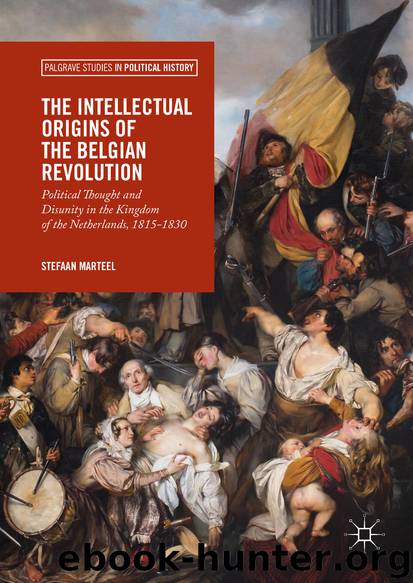The Intellectual Origins of the Belgian Revolution by Stefaan Marteel

Author:Stefaan Marteel
Language: eng
Format: epub
ISBN: 9783319894263
Publisher: Springer International Publishing
6.3 The Controversy Over the Oath and the Reconciliation Between Rome and the Government
Shortly after the constitution was proclaimed, the anti-constitutionalist clergy in the Southern Netherlands started to solicit the support of the Roman curie in its resistance to the government. They especially counted on Raffaele Mazion, one of the so-called ‘zelanti’ within the Congregation for Exceptional Clerical Matters (Congregazione degli Affari Ecclesiatici Straordinari).17 One important correspondent of Mazio was the former colleague of François-Xavier de Feller from Liège, ex-Jesuit Bernard de Saive. Saive symbolised the continuity of opposition against the politics of Joseph II and the opposition against the government of William I. As Le Surre, Saive described the conflict as a new battle against a ‘gouvernement philosophe.’ Bishop de Broglie, in a direct letter to the pope, described the ‘amalgam’ and the imposed liberty of religion as part of a satanic conspiracy to extinguish religion and to de-Christianise the Southern Netherlands. A sense of urgency also characterised these letters. Broglie wrote Mazio on 10 January 1816 that the united Catholic front had managed to keep the government in check, but that if the pope chose to remain silent much longer this could have dire consequences. However, also the government in The Hague was trying to get Roman support to make the clergy give up its anti-constitutional stance. In a note of 15 December 1815, it requested the institution of the former prince-bishop of Liège Comte de Méan to archbishop of Mechelen. Méan had taken the oath on the constitution to facilitate his appointment to the First Chamber of the kingdom. The anti-constitutionalist correspondents, in turn, severely criticised Méan, who, ‘surrounded by the most fanatical Napoleonists and philosophers,’ opposed the unanimous decisions of the Belgian higher clergy (de Valk 1998, 63–66).
In the spring of 1816 the Congregation for Exceptional Clerical Matters in Rome discussed in the course of four sessions the situation in the Netherlands. Although it in principle agreed with the anti-constitutionalist writers, the Congregation nevertheless suggested that the Holy See would seek a compromise with the government. The constitution was not condemned and negotiations were to be opened that could eventually lead to the conclusion of a new concordat. To resolve the question of the oath, Rome requested from Méan that he would provide a satisfying ‘explanation’ for his reasons for taking the oath. Simultaneously, the Holy See sent a letter of appreciation to Broglie (dated 1 May 1816), with the clear intention of keeping the opposition alive. After it thanked the bishop for informing the Holy See ‘with preciseness of everything which had happened in the Kingdom of the Netherlands concerning matters of the faith, and especially with regard to the constitution,’ it declared that the pope did not find it necessary to provide the prelate with instructions. ‘We can clearly see how zealously you take care after the interests of God and the church.’18
The Southern clergy was undoubtedly disappointed over these successive papal interventions. Nevertheless, it wrote a letter to the king, describing the papal
Download
This site does not store any files on its server. We only index and link to content provided by other sites. Please contact the content providers to delete copyright contents if any and email us, we'll remove relevant links or contents immediately.
| Africa | Americas |
| Arctic & Antarctica | Asia |
| Australia & Oceania | Europe |
| Middle East | Russia |
| United States | World |
| Ancient Civilizations | Military |
| Historical Study & Educational Resources |
Room 212 by Kate Stewart(5121)
The Crown by Robert Lacey(4817)
Endurance: Shackleton's Incredible Voyage by Alfred Lansing(4783)
The Iron Duke by The Iron Duke(4356)
The Rape of Nanking by Iris Chang(4213)
Joan of Arc by Mary Gordon(4110)
Killing England by Bill O'Reilly(4002)
Say Nothing by Patrick Radden Keefe(3986)
I'll Give You the Sun by Jandy Nelson(3447)
Shadow of Night by Deborah Harkness(3368)
Hitler's Monsters by Eric Kurlander(3343)
Mary, Queen of Scots, and the Murder of Lord Darnley by Alison Weir(3210)
Blood and Sand by Alex Von Tunzelmann(3205)
Eleanor & Park by Rainbow Rowell(3174)
Darkest Hour by Anthony McCarten(3133)
Margaret Thatcher: The Autobiography by Thatcher Margaret(3082)
Book of Life by Deborah Harkness(2939)
Red Famine: Stalin's War on Ukraine by Anne Applebaum(2934)
The One Memory of Flora Banks by Emily Barr(2863)
